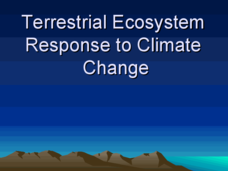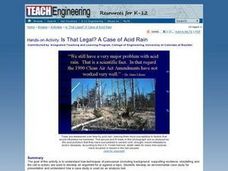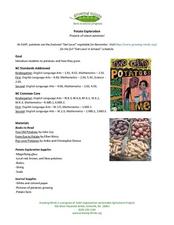Curated OER
Garden In a Glove
Students investigate the concept of seeds and how they can germinate. They obtain seeds and isolate them in a rubber glove before transplanting them into the ground. The lesson includes a graphic organizer for observations or information.
Curated OER
Sorting
Pupils identify how objects can be sorted or classified for easy access. In this sorting activity, students will investigate how letters, numbers, and symbols are used in sorting and classifying.
Curated OER
Identifying Erosion
Students identify erosion in various forms and explain its causes. They look for evidence of erosion on school grounds, describe it in their journals, and draw labeled rough sketches of the erosion.
Curated OER
Terrestrial Ecosystem Response to Climate Change
An extensive investigation of the Earth's climate changes awaits your environmental science classes. This top-notch presentation begins by looking at the history of Earth's climate and then predicts the impact on each major terrestrial...
Curated OER
Discovering Local Food Chains
Fourth graders study about food chains. With the assistance of a local biologist, Students hike the school trail system. They explore ecosystem and collect data by charting the organisms found and identifying the energy source. They...
Curated OER
"Lettuce" Learn About the Water Cycle
Young scientists investigate the water cycle through a lettuce seed experiment. For this experiment, learners plant lettuce seeds inside of a ziplock bag in order to create a small greenhouse. They observe condensation and precipitation,...
Curated OER
Dinner in a Woodland
After reading a short paragraph about what makes up a woodland habitat, fifth graders attempt to identify the primary consumers, secondary consumers, and third order consumers in two separate food chain scenarios. They also name a hawk's...
Curated OER
Wonderful Wetlands
Fifth graders describe a wetland habitat and its components. They provide, in writing, at least one example of a wetland food chain, relate wetlands to ecological functions, and relate the importance of wetland functions to their own...
Curated OER
Organic and Inorganic Waste
Students conduct a scientific investigation about organic or inorganic waste. In this organic or inorganic waste instructional activity, students create a compost heap to determine the difference between inorganic and organic...
Curated OER
Sustainable Livestock
Students investigate healthy eating habits by researching livestock. In this food sustainability lesson, students research the negative impact factory farming has on our environment due to pollution. Students define agricultural...
Curated OER
The Peanut Wizard
Students read and discuss information regarding George Washington Carver and how the peanut became cultivated in the southern colonies of the United States. In this George Washington Carver lesson, students develop vocabulary that...
Forest Foundation
Forest Health
Young foresters examine the strategies, like prescribed burns and thinning, that are employed to ensure healthy forests.
Curated OER
Is That Legal? A Case of Acid Rain
Develop an environmental case study! Elementary learners discover how a case study is used as an analysis tool. The goal of this activity is to show pupils how techniques of persuasion (including background, supporting evidence,...
US Environmental Protection Agency
Carbon Through the Seasons
Meteorologists view an animated video by the Environmental Protection Agency to learn how the carbon cycle works, and then move into groups to analyze and graph actual data of the atmospheric carbon dioxide concentration from Hawaii's...
Forest Foundation
The Sustainable Forest
As part of their examination of forest ecosystems, class members examine how foresters, biologists, botanists, geologists, and hydrologists work to together to develop a management plan for sustainable forests.
Growing Minds
Potato Exploration: Projects All About Potatoes!
How many potatoes tall are you? Unearth this rich resource! A reading of John Coy’s Two Old Potatoes begins a cross-curricular exploration of potatoes. Class members read, write, weigh, measure, and experiment with potatoes. Additional...
Curated OER
Praire Biome Models
Fifth graders, in groups, list the physical characteristics of a biome and think of ways in which animals might have to adapt to live there and make a biome mobile ball that show the different types of habitats that shape the praire biome.
Forest Foundation
Forest Watersheds
Where does the water we use come from? To understand the concept of a watershed, class members study the water cycle and then engage in an activity that simulates a watershed.
National Park Service
Living & Non-Living Interactions
What better way to learn about ecosystems than by getting outside and observing them first hand? Accompanying a field trip to a local park or outdoor space, this series of collaborative activities engages children in...
Curated OER
Weathering and Erosion
Fourth graders take a look at the effects of weathering and other geologic activities found in the environments in which they live. Along with a guided geologic walk outside of campus, there is also an effective in-class demonstration of...
National Wildlife Federation
Habitat Web
Young scientists weave together an understanding of ecosystems with this fun collaborative activity. Taking on the roles of different living and non-living elements of specific habitats, learners use a ball of yarn to create...
Nuffield Foundation
Microbes Ate My Homework
Now you have a new excuse not to do your homework. A long-term experiment has learners explore cellulose-digesting enzymes. They simulate how paper breaks down in a compost bin. There's no need to blame your dog for eating your homework...
Curated OER
Landscape Garden Makeover
A project-based learning plan focuses on landscapes in the community. After identifying problems, such as dead trees or misplaced automatic sprinklers, learners design solutions, contact local organizations to fix the problems, and do...
Curated OER
Layers of the Rainforest
What a great way to discuss the rainforest! Learners discuss the importance of adaptation in the environment and how it is linked to survival. They use critical thinking and inference skills to place animals and insects in the different...
Other popular searches
- Plants and Soil Erosion
- Growing Plants Without Soil
- Soil Plants
- Growing Plants Without Soil.
- Plants Soil Bogs
- Can Plants Grow Without Soil
- Soil and Plants
- Science Plants and Soils























